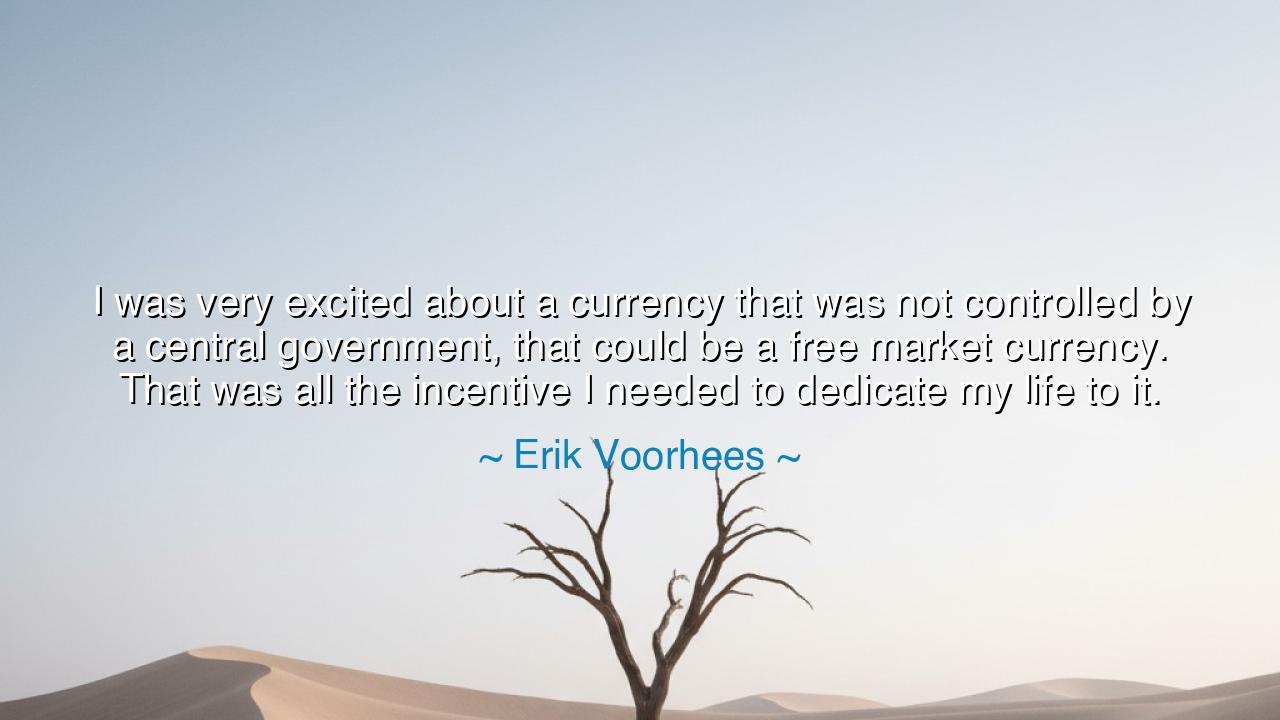
I was very excited about a currency that was not controlled by a
I was very excited about a currency that was not controlled by a central government, that could be a free market currency. That was all the incentive I needed to dedicate my life to it.






“I was very excited about a currency that was not controlled by a central government, that could be a free market currency. That was all the incentive I needed to dedicate my life to it.” Thus spoke Erik Voorhees, one of the early visionaries of the digital age — a man who glimpsed in the rise of cryptocurrency not merely a financial revolution, but the rebirth of liberty itself. His words carry the fervor of one who has seen chains and seeks to break them; they are the utterance of a soul who believes that freedom, once awakened, must find expression even in the realm of money. For to Voorhees, the idea of a currency free from the grasp of government was not a novelty of technology, but a declaration of independence — a call to reclaim power from institutions that have long governed wealth, and through wealth, the destiny of humankind.
The origin of this quote lies in the early years of the cryptocurrency movement, when a handful of pioneers stood at the edge of a vast and uncertain frontier. Bitcoin had only recently emerged — a strange, decentralized creation born not from banks or kings, but from code and consensus. It promised a financial system without masters, a marketplace without permission. Voorhees, like many of his generation, was drawn to this vision not for profit, but for principle. He saw in it a way to challenge the age-old dominance of centralized authority — to restore to individuals the control over their own labor, exchange, and destiny. Where others saw speculation, he saw liberation.
In his words, “That was all the incentive I needed to dedicate my life to it,” we hear the echo of the revolutionary spirit that has moved humankind through the ages. There were always those who looked upon the existing order and said, “This shall not stand.” The inventors of printing broke the monopoly of knowledge; the founders of republics broke the rule of kings; the creators of open networks broke the walls of censorship. So too did Voorhees and his kind seek to break the chains of monetary control, believing that a free people deserve a free economy — one not shaped by the decrees of central banks or the ambitions of governments, but by the will of those who trade and create.
To grasp the weight of this, one must look to history’s great lesson: that money is never neutral. It has always been the lifeblood of power. In ancient Rome, emperors debased the silver coin to fund their wars; in Weimar Germany, the printing presses drowned the mark in inflation; in every age, the control of currency has meant the control of lives. The rise of Bitcoin and its kin was a rebellion against that cycle — a return to the idea that value can exist without permission, and that trust can be built not on the word of rulers, but on the strength of mathematics and mutual consent. In this, Voorhees was not unlike the ancient philosophers of freedom, who taught that the just society is one where the individual governs himself.
And yet, his excitement was not naïve. Voorhees understood the inconvenience of freedom — that to live without a master is to bear responsibility for one’s own choices. A decentralized currency is not without risk: it is volatile, unprotected, and often misunderstood. But to him, these were not flaws; they were the price of autonomy. He saw in the roughness of this new world the same beauty the pioneers once saw in uncharted lands. For every invention that frees mankind comes first with peril, and only later with peace. The journey to liberty has always been costly, but never without worth.
Consider the example of Johannes Gutenberg, whose printing press shattered the monopoly of knowledge held by the powerful. His invention was condemned by kings and priests alike, for it gave every man the power to read, to think, and to question. Likewise, the architects of cryptocurrency are often maligned, accused of chaos and subversion. But history will remember that innovation is always rebellion — and rebellion, when guided by principle, becomes renewal. Voorhees’s faith in a free market currency is thus not a rejection of order, but a belief in a higher order: one that arises naturally from the voluntary cooperation of free minds.
The lesson, then, is clear: freedom begins where control ends. Whether in money, in speech, or in thought, the right to act without coercion is the foundation of all progress. Voorhees’s words remind us that liberty is not bestowed by governments; it is built by individuals who dare to imagine new systems. His life’s work calls each of us to examine our own dependence — to ask where we have traded convenience for control, and how we might reclaim what belongs to us.
So let this be your reflection: that innovation, born of courage, is the weapon of the free. Do not fear the new, nor worship the old; test all things by the measure of liberty. For the chains of control are often woven of habit, not of iron. And when you find within your heart an idea that could set others free — as Voorhees did — let that be all the incentive you need to dedicate your life to it. For the future belongs not to those who obey the systems of their age, but to those who dare to create new ones.






AAdministratorAdministrator
Welcome, honored guests. Please leave a comment, we will respond soon